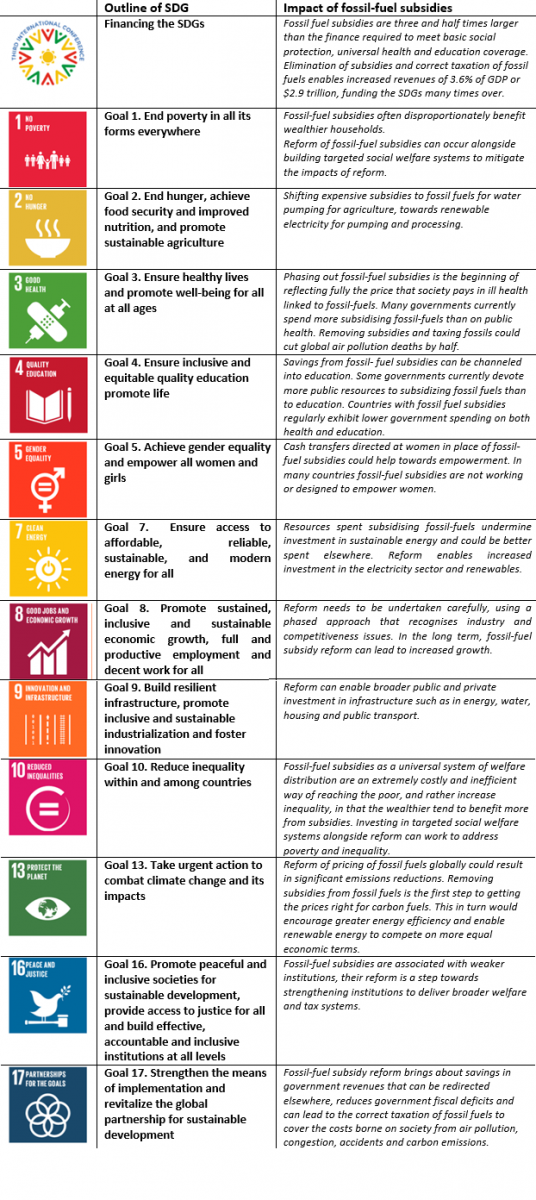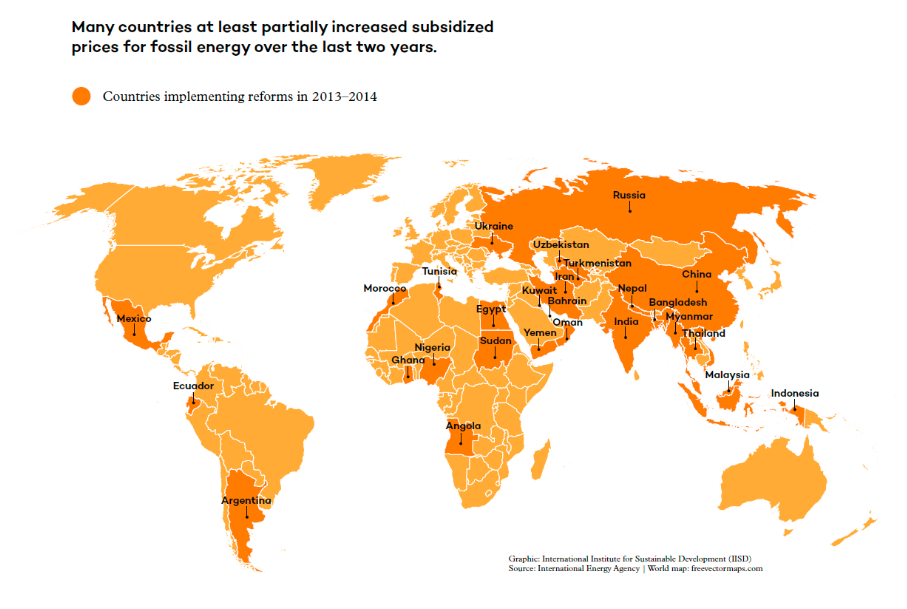Eliminating Fossil Fuel Subsidies Still on the Agenda – The International Community Must Now Walk the Talk
The international community reaffirmed commitments on Thursday 16th July 2015, within the Addis Ababa Action Agenda "to rationalize inefficient fossil-fuel subsidies that encourage wasteful consumption ..." and "phasing out those harmful subsidies". Fossil fuel subsidy removal remains on the agenda and is as important as ever when governments are squeezed for fiscal space and domestic resource mobilisation. Fossil fuel subsidies are large and estimated around US$ 550 billion in 2013. This is four times the level of development assistance from the OECD or four times the amount of money governments spend on supporting renewable energy. Subsidies to fossil fuels are three and a half times larger than the cost to finance basic social protection, universal health and education coverage for the poorest. Removing fossil fuel subsidies would reduce carbon emissions by between 6 to 13 % by 2050 and is one of five actions on energy that we must take to stay within a 2° warming target. They are a drain on government budgets, they are bad for the environment, and they do not target the poor. They need to go.
Fossil Fuel Subsidy Impacts across the Sustainable Development Goals
There are many other reasons why this issue is referred to as a "low hanging fruit". If done the right way fossil fuel subsidy reform can lead to better, fairer welfare systems and investment in low carbon infrastructure by governments as outlined in the table below.

International Efforts
There have been a number of international statements encouraging fossil fuel subsidy reform. Back in 2009 the G20 committed in the Pittsburgh Summit:
- "To phase out and rationalize over the medium term inefficient fossil fuel subsidies while providing targeted support for the poorest. Inefficient fossil fuel subsidies encourage wasteful consumption, reduce our energy security, impede investment in clean energy sources and undermine efforts to deal with the threat of climate change".
Since then G20 governments have reconfirmed commitments to this action, five times over. Most recently in Australia, in November 2014.
APEC also committed to similar wording in 2009:
- "We also commit to rationalize and phase out over the medium term fossil fuel subsidies that encourage wasteful consumption, while recognizing the importance of providing those in need with essential energy services".
And again, five times over, the latest being at the China 2014 summit with very similar wording to the above.
To support these commitments and efforts, the Friends of Fossil Fuel Subsidy Reform group (Friends) was set up in 2010. This group of eight countries has raised the issue of fossil fuel subside reform consistently through joint diplomatic calls every year across G20 and APEC countries since 2010, and through numerous side events within the UNFCCC, Clean Energy Ministerial, World Bank meetings and the like to raise the issue.
Most recently in 2015 the Friends launched a Fossil Fuel Subsidy Reform Communiqué to move these commitments forward and in light of attaining a global climate agreement in Paris at the end of the year. The US, France and Morocco have also endorsed this Communiqué. Within the G20 and APEC: China, Germany, Peru, the Philippines, Vietnam, Mexico, New Zealand and the United States have agreed to undergo peer review in order to increase transparency around domestic fossil fuel subsidies.
Civil Society Organisations have consistently pushed the issue, particularly in the lead up to Rio +20 resulting in numerous activities, including an online vote in which 1.37 million votes were cast, and the number one recommendation under Sustainable Energy for All was "take concrete steps to eliminate fossil-fuel subsidies". Yet within the UN this important energy issue was removed from the SDG energy goal 7 entirely.
On the ground many countries are rather getting on with the job of reforming fossil fuel subsidies, both pushed towards the end of 2013 with the high oil price because they had to (government fiscal deficits becoming unsustainable), but also pulled since the end of 2014 and in the beginning of 2015 within the current low oil price because they can (with lower pass through costs to consumers). This is particularly the case in the Middle East and North Africa (see the diagram below). Progress within the G20, on the other hand, and in particular on producer subsidies, has been very slow.

So now is the time for active reform and government planning, because countries have already made past commitments, because reform is easier for many countries in times of a low oil price and because countries can learn from each other and are moving in this direction. Now is not the time for watering down international commitments, but rather about finding constructive ways to support countries in their efforts to reform through technical assistance, financial support and general encouragement. Yet text in both the Sustainable Development Goals and Financing for Development include watered down wording around the elimination of these subsidies. In both venues parties must make efforts to both maintain and to improve language.
Financing for Development
The Addis Ababa Action Agenda retains text from July negotiations in New York:
- "We reaffirm the commitment to rationalize inefficient fossil-fuel subsidies that encourage wasteful consumption by removing market distortions, in accordance with national circumstances, including by restructuring taxation and phasing out those harmful subsidies, where they exist, to reflect their environmental impacts, taking fully into account the specific needs and conditions of developing countries and minimizing the possible adverse impacts on their development in a manner that protects the poor and the affected communities".
Countries (the EU, Switzerland, New Zealand, Mexico and Palau) made efforts to improve the text and called for phasing out fossil fuel subsidies as opposed to rationalizing them. Yet this was opposed by Canada who have already committed, five times to joint G20 statements to "phase out and rationalize" these subsidies. The Global Subsidies Initiative and the Friends of Fossil Fuel Subsidy Reform held a side event in Addis and promoted a GSI report that explores financing the SDGs through fossil fuel subsidy reform.
Sustainable Development Goals
Last summer, in 2014, language towards agreement of the SDGs was watered down on this issue. Fossil fuel subsidies, despite being the most popular voted for Energy Goal, moved from being a goal and into the "Means of Implementation" supporting Goal 12. "Ensure sustainable consumption and production patterns". The current text now stands as:
- 12.c "Rationalize inefficient fossil-fuel subsidies that encourage wasteful consumption by removing market distortions, in accordance with national circumstances, including by restructuring taxation and phasing out those harmful subsidies, where they exist, to reflect their environmental impacts, taking fully into account the specific needs and conditions of developing countries and minimizing the possible adverse impacts on their development in a manner that protects the poor and the affected communities"
Ironically, and due to some sterling lobbying efforts, the zero draft now includes actually increasing subsidies to fossil fuels via cleaner fossil-fuel technology under the energy goal which is goal 7: "Ensure access to affordable, reliable, sustainable and modern energy for all" via the "Means of Implementation".
Fossil Fuel Subsidies Make No Sense
Many reasons have been given as to why it makes sense to get rid of these subsidies to fossil fuels. The critical one is that getting rid of the fossil fuel subsidy burden could liberate government resources to invest in more productive sectors of society – to targeted safety nets, to health, to education (as in the Philippines and Indonesia), and to support sustainable energy systems (as in Ethiopia and Morocco). This is one action that would pay for itself many times over. There are many big texts coming up in 2015 for government delegations to pour over and negotiate where the potential for reform of fossil fuel subsidies could be unlocked for sustainable development: Financing for Development, the Sustainable Development Goals and an agreement on Climate Change. And there will be arguments over missing full stops, sentences that are never ending, and the difference between "rationalise" and "phase out", even the meaning of the word ‘subsidy’ itself. It is important to maintain and strengthen such language that gives international direction to our sustainable development pathway. However, in the end it is what you do about it that counts the most, not what you say. Many countries want to remove these subsidies, they need support and encouragement to do this, now.
